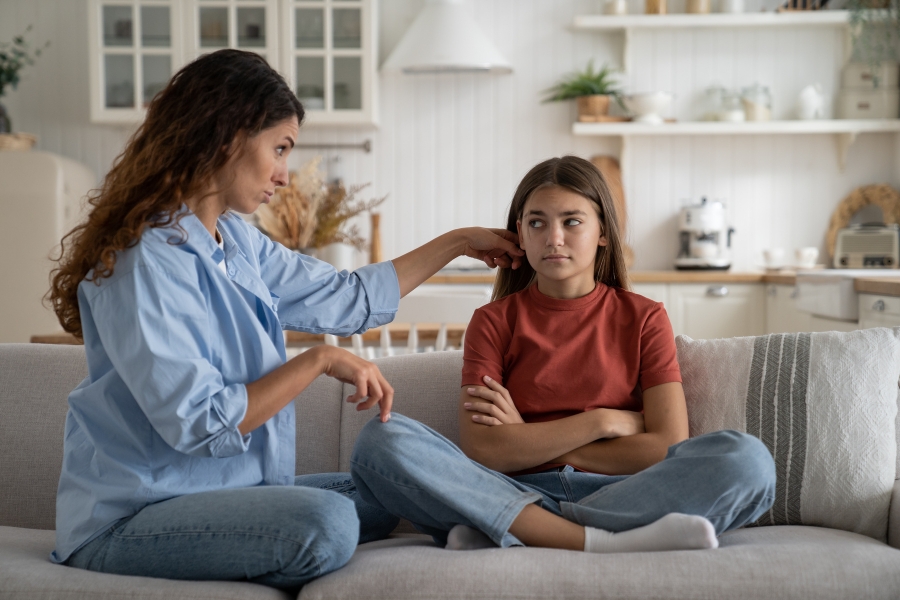How to Protect Your Children’s Well-being During Divorce

Going through a divorce is a seismic emotional event that can reshape the entire landscape of your family's life.
For children, this transition is particularly challenging, as it can create complex emotional terrain that profoundly impacts their psychological development and future relationships.
And while the end of a marriage can bring immense pain and difficulty for everyone involved, children often bear the most significant emotional burden, experiencing a kaleidoscope of feelings that range from confusion and fear to sadness and sometimes even unexpected relief.
In any case, modern child psychology research offers a nuanced perspective on divorce's impact.
Contrary to traditional beliefs, the dissolution of a marriage does not inherently cause long-term emotional damage.
Instead, the manner in which parents navigate the separation process becomes the critical factor in determining your children’s well-being during divorce, or lack thereof.
And if you choose to model healthy ways of processing strong emotions and loss, it will have a profoundly positive impact on your children throughout their lives.
At any rate, children possess remarkable resilience, and when they’re provided with consistent love, transparent communication, and comprehensive emotional support, they have the potential to smoothly adapt to significant life changes, including divorce.
So, if you’re wondering how divorce affects children emotionally, or you want to know what you can do when it comes to minimizing the impact of divorce on children, then keep reading to learn more.
What Are the Effects on Children’s Well-being During Divorce?

If you want to truly understand how children experience divorce, it requires a deep dive into developmental psychology.
What’s more, each age group processes family changes differently, and so the effects on children’s well-being during divorce won’t be the same for a toddler as they would be for a teenager, and this makes a one-size-fits-all approach ineffective.
And if you fail to approach your divorce in a way that prioritizes their well-being, you can rest assured that your children will let you know when they’re older.
With that in mind, let’s look at how divorce affects children emotionally, and explore some strategies for helping children cope with divorce across various age groups.
Preschool Children: Navigating Emotional Uncertainty
For children between three and five years old, the world is a place of absolute dependency and limited comprehension.
That being said, divorce can trigger profound feelings of insecurity that challenge their fundamental understanding of things like family and safety.
These young children lack the cognitive tools to fully understand the concept of marital separation, and this can lead to some incredibly intense emotional responses.
Moreover, preschoolers tend to internalize family tensions in ways that may not be immediately apparent or easy to understand.
What’s more, children of this age often lack the ability to communicate their feelings verbally, as they simply do not have the vocabulary yet.
They might develop separation anxiety, experience regression in developmental milestones, or exhibit behavioral changes that seem unrelated to the divorce.
For instance, a child who was previously potty-trained might suddenly start having accidents, or a typically confident child might become unusually clingy and fearful.
And keep in mind that it’s easy to jump to conclusions, like assuming this behavior is a sign of parental preference or dysfunctional parenting in one home, but oftentimes, that’s not the case.
At any rate, divorcing parents of preschool-aged children must focus on creating an environment of emotional safety.
This means using simple, concrete language when explaining changes, maintaining consistent daily routines, and providing excessive reassurance of both parents' continued love.
Creating a consistent child sharing plan is also important, as frequent and continuing contact with both parents provides stability and minimizes anxiety.
For instance, if you make a visual parenting calendar that you allow your child to color, this will help to reassure them that everything is all right.
And displaying the calendar in your home reminds them of when they’ll see the other parent in a developmentally appropriate way.
Moreover, visual aids like family photographs, consistent schedules, and gentle explanations can also help young children process the transition.
School-Aged Children: The Complex World of Emotional Processing
Children between six and twelve bring more sophisticated emotional and cognitive capabilities to their divorce experience.
They possess a more developed understanding of relationships, which simultaneously enables them to experience deeper comprehension and increased emotional complexity.
However, this age group is particularly vulnerable to internalizing blame for the divorce.
Many children develop elaborate internal narratives where they believe their behaviors or actions somehow caused the separation of their family.
School-aged children may also experience significant loyalty conflicts, as they may feel torn between supporting and loving both parents.
Children might also struggle with expressing their true feelings, as many of them fear that showing affection to one parent could be perceived as a betrayal of the other.
Having said that, you must be vigilant in repeatedly and explicitly communicating that the divorce is not the child's fault and that you want them to have a loving relationship with both parents.
And during this developmental stage, it’s also crucial for divorcing parents to create safe spaces that allow for open, judgment-free communication.
In addition, parents should do everything possible to insulate their children from their emotions toward the other parent or the divorce itself.
Teenagers: Sophisticated Emotional Responses
Teenagers bring the most intellectually complex processing to the divorce experience.
With more developed emotional intelligence and emerging independence, they experience a multifaceted range of responses that can include anger, sadness, relief, and even a sense of increased personal autonomy.
For teenagers, divorce can significantly impact their developing understanding of things like relationships and trust.
They may experience heightened anxiety about future romantic relationships, develop trust issues, or feel a sense of emotional vulnerability.
At the same time, some teenagers might respond by becoming more withdrawn, while on the other hand, others might seek increased independence or start acting out in ways they never would have before in a misguided attempt to try to cope with the situation.
With that in mind, divorcing parents of teenagers should make sure to balance providing emotional support with respecting their children’s growing autonomy, while still understanding that they must insulate their children from their own pain and emotions.
This means involving them in age-appropriate discussions, acknowledging their feelings without judgment, and avoiding the temptation to use them as emotional confidants or mediators in conflicts with your former spouse.
In any case, children do not want to be in the middle of your divorce regardless of their age, but teens are particularly vulnerable to this dynamic because of their level of maturity.
It’s also important to keep in mind that teenagers tend to be much more opinionated about their schedules, so if you want to protect their well-being, it's important to listen to them, as they may have preferences about which parent they stay with and when, and they may have good reasons for these preferences.
Strategies for Protecting Your Children’s Well-being During Divorce

Now that you understand how a divorce can negatively affect your children’s well-being, you’re probably wondering what you can do to mitigate that or stop it from happening in the first place.
With that in mind, let’s look at some strategies that can help you protect your children’s well-being during divorce.
Professional Support
Recognizing when children need additional emotional resources is a critical aspect of responsible parenting during divorce, as children often need to talk to someone other than a parent to process the changes in their family.
For example, individual therapy, family counseling, and support groups designed specifically for children of divorce can offer invaluable resources.
School counselors can also provide additional support, helping children manage academic and social challenges that might arise during family transitions.
That being said, it’s a good idea to let teachers know if something significant is happening in your family so they can partner with you to provide additional support.
This kind of professional support is often incredibly important, as it can provide children with the specialized tools they need to process their emotions and develop healthy coping mechanisms.
Parental Self-Care
As much as you need to protect your children’s well-being during divorce, it’s just as important to protect your own emotional health, and that of your former spouse, as it can have a direct and profound impact on how your children adapt to divorce.
Because when parents are emotionally regulated, practicing self-care, and processing their own feelings constructively without involving the children, it’s much easier for them to create a more stable environment for their children's healing while also setting a positive example.
This means pursuing individual therapy, developing robust personal support networks, practicing stress-reduction techniques, and modeling healthy emotional processing.
And while it’s important for you and your former spouse to seek support from peers, family, or professional therapists, you should refrain from confiding in your children or using them for emotional support, as this can make things even tougher on them.
Also, be careful about having conversations with peers and family in the presence of or within hearing distance of your children, as they’re often paying attention even when you think they’re not and they may hear things that increase their worry and anxiety.
Moreover, they may also repeat things to the other parent, which can increase conflict.
Unified and Flexible Co-Parenting
Aside from everything we’ve already mentioned, if you want to protect your children’s well-being during divorce, it’s going to require a collaborative approach that prioritizes their emotional well-being over personal conflicts.
This means developing a unified co-parenting strategy that transcends individual grievances and focuses exclusively on supporting your children's psychological health.
In order to do this, you’ll have to create consistent household rules, maintain transparent communication about your children's needs, and never disparage the other parent.
Technology can also be a valuable tool in facilitating clear, respectful communication between separated parents.
Things like shared digital calendars, co-parenting apps, and structured communication protocols can help you minimize potential conflicts and develop good co-parenting skills.
However, parents must also be willing to be flexible and adjust their approach to the evolving needs of their children.
For instance, a parenting strategy that works for a seven-year-old might need significant modifications when that child becomes a teenager.
And this will all be much easier if you have good communication and co-parenting skills.
Something else to remember is you should be mindful to always confirm things with your former spouse instead of accusing them of something if your child comes home upset for some reason.
The reality is children are not always reliable reporters, especially if they’re upset with a parent.
In any case, regular check-ins, willingness to listen to your children's experiences, respectful co-parenting communication, and openness to professional guidance can all help you to effectively adapt your co-parenting approach.
Final Words
Divorce is not a singular event but a complex, evolving process of familial transformation.
But by maintaining a child-centered approach, you and your former spouse can help your children develop remarkable emotional resilience.
The goal here is not to prevent all emotional pain, but to provide the necessary support, love, and resources for navigating this challenging transition.
At the end of the day, each child's experience is unique, and it requires personalized attention, patience, and unconditional love.
It’s also important to note that the journey through divorce is rarely linear, and there will be challenging days, unexpected emotional waves, and moments of uncertainty.
But with consistent love, transparent communication, and a commitment to collaborative parenting, children and their families can emerge from this experience not just intact, but potentially stronger and even more emotionally intelligent.
If you’d like to learn more about the Compassionate Divorce protocol, you can read our article, Breaking Up Amicably: The Benefits of Compassionate Divorce or contact us for more information.
